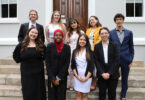In May, the university took part in the world’s largest annual biotechnology industry event for the first time bringing researchers, students and staff to Atlanta for four days of networking, marketing and insights into major trends affecting the industry.
More than 25 UGA faculty and 22 students, including
14 faculty supported by UGA-funded scholarships, attended BIO. UGA technology commercialization and economic development staff marketed UGA technologies at the meeting under the banner “Sowing seeds of innovation.”
The 2009 BIO International Convention drew more than 14,000 industry, government and academic leaders from 58 countries and 48 states to discuss how to help heal, fuel and feed the world through biotech innovation.
Susan Sanchez, an associate professor in the College of Veterinary Medicine’s infectious diseases department, said that the companies, organizations and states marketing their products were equally interested in her ideas. The level of support for individuals who are potential entrepreneurs like herself “made starting a company seem like a very real possibility,” she said.
Al Ray, a sophomore majoring n cell biology, attended with Sanchez, his research mentor. Although Ray, who also is an apprentice with the Center for Undergraduate Research Opportunities, envisions pursuing a career in medicine and research, he said that the two days he spent at the BIO convention “opened [his] eyes to the business side of the sciences.”
Ray said the magnitude of the exhibit hall especially surprised him: More than 1,800 exhibitors working to solve some of society’s greatest challenges through biotechnology.
Deb Mohnen, a professor of biochemistry and molecular biology in the Franklin College of Arts and Sciences, works with UGA’s BioEnergy Science Center and the UGA Biofuels, Biopower and Biomaterials Initiative to understand how to improve biomass so that it’s easier and more cost-effective to convert them into ethanol.
BIO gave Mohnen an opportunity to hear what industry is doing. Mohnen said she also was struck by the biotech industry’s “awareness of their need to use biogreentech and other means to promote energy security and environmental sustainability.”
For UGA’s technology commercialization office, BIO was an opportunity to make or strengthen contacts with industry leaders that may lead to licensing of UGA technologies, sponsored research and other kinds of partnerships.
UGA researchers, students attend industry event for biotechnoogy
UGA researchers, students attend industry event for biotechnoogy







